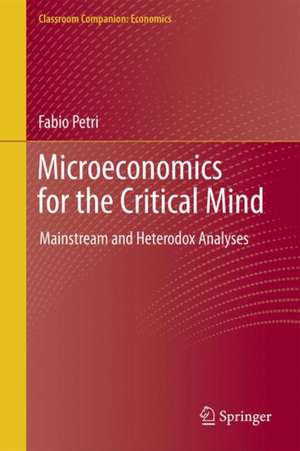Microeconomics for the Critical Mind: Mainstream and Heterodox Analyses: Classroom Companion: Economics
Autor Fabio Petrien Limba Engleză Hardback – 25 mai 2021
The book also addresses various microeconomicissues not generally included in advanced microeconomics textbooks, including differential land rent, joint-production long-period pricing, capital theory from Walras to the Cambridge debates, the foundations of aggregate production functions, the microeconomics of labor markets, and the long-period theory of wages. Lastly, it presents a unique re-evaluation of welfare economics. Intended for advanced undergraduate and graduate microeconomics courses, this textbook offers a comprehensive introduction to the various approaches and different schools of thought currently competing in the context of economic theory. It can also be used in courses on value and distribution, heterodox economics, and the history of economic analysis. In the present situation, characterized by scientific uncertainty and the co-existence of competing approaches, it will stimulate students to form their own opinion as to which approach appears more promising from a scientific standpoint.
Preț: 585.00 lei
Preț vechi: 731.25 lei
-20% Nou
Puncte Express: 878
Preț estimativ în valută:
111.95€ • 116.17$ • 93.57£
111.95€ • 116.17$ • 93.57£
Carte disponibilă
Livrare economică 25 februarie-11 martie
Livrare express 08-14 februarie pentru 97.09 lei
Preluare comenzi: 021 569.72.76
Specificații
ISBN-13: 9783030620691
ISBN-10: 3030620697
Pagini: 1395
Ilustrații: XXII, 1395 p. 276 illus., 37 illus. in color. In 2 volumes, not available separately.
Dimensiuni: 155 x 235 x 91 mm
Greutate: 2.36 kg
Ediția:1st ed. 2021
Editura: Springer International Publishing
Colecția Springer
Seria Classroom Companion: Economics
Locul publicării:Cham, Switzerland
ISBN-10: 3030620697
Pagini: 1395
Ilustrații: XXII, 1395 p. 276 illus., 37 illus. in color. In 2 volumes, not available separately.
Dimensiuni: 155 x 235 x 91 mm
Greutate: 2.36 kg
Ediția:1st ed. 2021
Editura: Springer International Publishing
Colecția Springer
Seria Classroom Companion: Economics
Locul publicării:Cham, Switzerland
Cuprins
The Classical or Surplus Approach.- Long-Period Prices.- Introduction to the Marginal Approach.- Consumers, and the Exchange Economy.- Firms, Partial Equilibria, and the General Equilibrium with Production.- Existence, Uniqueness and Stability of Non-capitalistic General Equilibria.- Capital: Long-Period Equilibria.- Intertemporal Equilibrium, Temporary Equilibrium.- Uncertainty and General Equilibrium.- Back to Long-Period Prices.- Games and Information.- Product Markets: Pricing, Capacity, Investment, Imperfect Competition.- Labour Markets and Income Distribution.- Welfare, Externalities, Public Goods, Happiness.- Mathematical Review.
Recenzii
“This is both an enormous book and a huge achievement by the Sienese economist Fabio Petri. … The volume is to be highly recommended both as a study book and a reference work to students and lecturers of economics and the history of economic analysis interested in the analytical cores of alternative theories – classical, Marxian, neoclassical, Keynesian and Kaleckian. … He is to be congratulated for a remarkable achievement.” (Heinz D. Kurz, The European Journal of the History of Economic Thought, Vol. 29 (5), 2022)
Notă biografică
Fabio Petri is Professor of Economics at the University of Siena, Italy. He has published works on capital theory, Sraffian economics, Marxian economics, topics on which he is a recognized specialist and on which he has been called to contribute in the New Palgrave Dictionary of Economics, the Elgar Companion to Classical Economics, the Handbook of the History of Economic Analysis. Recently retired, he continues to teach microeconomic theory to Master’s and PhD students.
Textul de pe ultima copertă
This textbook explains comprehensively and in rigorous detail not only mainstream microeconomics, but also why many economists are dissatisfied with major aspects of it, and the alternative that they are exploring in response: the Classical-Keynesian-Kaleckian approach. This advanced yet user-friendly book allows readers to grasp the standard theory of consumers, firms, imperfect competition, general equilibrium, uncertainty, games and asymmetric information. Furthermore, it examines the classical approaches to value and income distribution advocated by Adam Smith, David Ricardo and Karl Marx, as well as Post-Keynesian pricing theory, and the microeconomics of variable capacity utilization. Using simple models, it highlights the analytical roots of the important differences between the marginal/neoclassical approach and the classical-Keynesian, critically examining the plausibility and reciprocal consistency of their assumptions.
The book also addresses various microeconomic issues not generally included in advanced microeconomics textbooks, including differential land rent, joint-production long-period pricing, capital theory from Walras to the Cambridge debates, the foundations of aggregate production functions, the microeconomics of labor markets, and the long-period theory of wages. Lastly, it presents a unique re-evaluation of welfare economics.
Intended for advanced undergraduate and graduate microeconomics courses, this textbook offers a comprehensive introduction to the various approaches and different schools of thought currently competing in the context of economic theory. It can also be used in courses on value and distribution, heterodox economics, and the history of economic analysis. In the present situation, characterized by scientific uncertainty and the co-existence of competing approaches, it will stimulate students to form their own opinion as to which approach appears more promising from a scientific standpoint.
The book also addresses various microeconomic issues not generally included in advanced microeconomics textbooks, including differential land rent, joint-production long-period pricing, capital theory from Walras to the Cambridge debates, the foundations of aggregate production functions, the microeconomics of labor markets, and the long-period theory of wages. Lastly, it presents a unique re-evaluation of welfare economics.
Intended for advanced undergraduate and graduate microeconomics courses, this textbook offers a comprehensive introduction to the various approaches and different schools of thought currently competing in the context of economic theory. It can also be used in courses on value and distribution, heterodox economics, and the history of economic analysis. In the present situation, characterized by scientific uncertainty and the co-existence of competing approaches, it will stimulate students to form their own opinion as to which approach appears more promising from a scientific standpoint.
Caracteristici
Offers a comprehensive overview of the status quo in microeconomic theory Introduces both mainstream and alternative classical-inspired economic approaches Discusses the reasons for the current discontent with neoclassical general equilibrium theory Presents a unique re-evaluation of welfare economics








